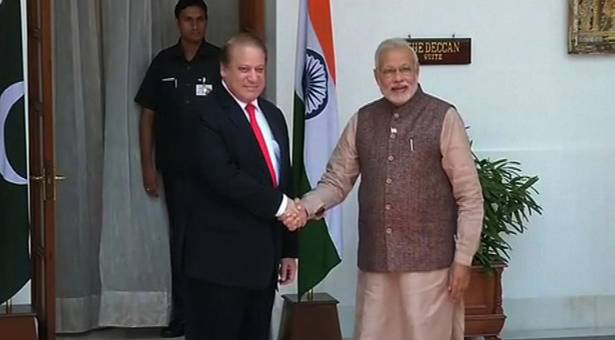While the main reason for Asian leaders being present in Russia was to be part of the Shanghai Cooperation Organisation (SCO), from a South Asian point of view the bigger talking point will be the meeting between Prime Minister, Nawaz Sharif and his Indian counterpart, Narendra Modi. In a lengthy meeting, both leaders agreed to restart the stalled dialogue process and to work towards a more peaceful region; the highlight being Modi’s visit to Islamabad scheduled for 2016.
While this is a positive development, which allows us to be cautiously optimistic about the future, Nawaz Sharif has been too pliant, not just in this meeting, but during the course of the relationship. While local politicians may criticise the body language and the postures adopted by the Prime Minister during the meeting, the real problem lies in the five-point agenda agreed by the leaders.
The first point calls for a meeting in New Delhi between the two countries' national security advisers to discuss all issues connected to terrorism, and the fifth calls for expediting the Mumbai attacks trial. The accusation is obvious. ‘Terrorism’ refers to those activities allegedly carried out by Pakistani groups; an implication that becomes stronger in light of the constant use of the word by Indian officials – Modi included – when referring to Pakistan. Yet, Pakistan also has to deal with Indian interference in Balochistan, Kashmir and Afghanistan, and high-ranking Indian officials have admitted to sponsoring terrorism in Pakistani territory. Without an explicit mention of these regions, or cases like the Samjhota Express, the agreement is lopsided.
Another glaring omission is any mention of Kashmir, which at the end of the day remains the root of the conflict between both nations. It is in the interest of the occupying force to sidestep discussion on the occupation and Nawaz has allowed Modi to do just that. Border skirmishes, religious tourism and captured fishermen are secondary issues, all by products of the Kashmir conflict.
This capitulation is all the more glaring once we compare Nawaz Sharif’s peaceful overtures to Modi’s hawkish statements preceding this meeting. Nawaz should have extracted more concessions than he did. Perhaps a bad deal was the price he had to pay to break the ice between the two nations, and perhaps in the course of the dialogue on other subjects Kashmir can be made an issue, but at the moment it seems unlikely.






